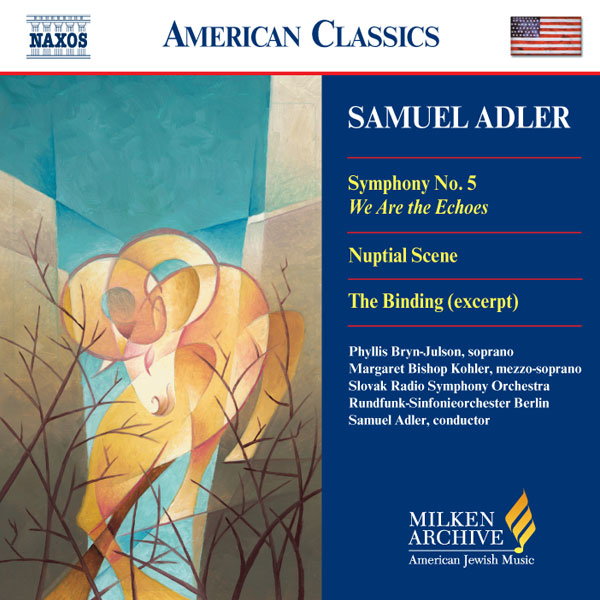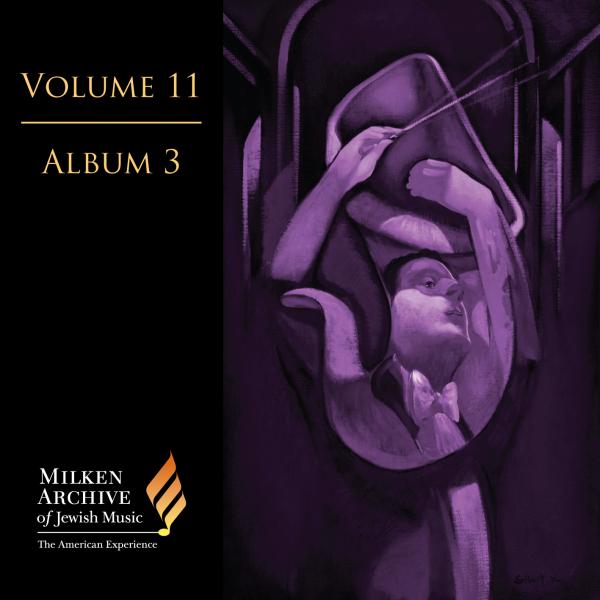Tracks
Track |
Time |
Play |
| I. We Go | 03:41 | |
| II. Even During War | 04:52 | |
| III. The Future | 04:57 | |
| IV. We Are The Echoes | 06:39 | |
| V. God Follows Me Everywhere | 05:11 |
Liner Notes
Symphony No. 5, subtitled We Are the Echoes, was begun in Rochester in October 1974 and completed in Vienna in February 1975. In five movements, the symphony calls for a large orchestra and soprano soloist. It is based on Jewish poetry that reflects aspects of Jewish experience throughout history. The first movement is centered around a German poem, “We Go,” by Karl Wolfskehl, translated by Valhope and Morwitz. It tells of the hunted, hounded, wandering Jew through the ages. The voice relates the dreadful tale of endless persecution, with the orchestra lending dramatic urgency by its driving pace in a relentless perpetual motion. The feared “knock at the door,” which has so often signified death, begins the movement, and reminders of it pervade the entire symphony.
“Even During War,” by the American poet Muriel Rukeyser, serves as text and inspiration for the music of the second movement. It speaks of hope and peace in the face of hardship and gloom. In ternary form, the two outer segments are lyrical and reflective in mood, while the middle portion is in a contrasting fast tempo.
The source of the third movement is a short poem by James Oppenheimer titled “The Future.” It mirrors the Jews’ “mission” in a conversation between a man and a stranger (the Future) knocking at the door. The demand for complete dedication is acknowledged by the man’s eventual resolve “to follow unquestioningly the unknown.” There are special orchestral effects in winds and strings, including glissandi, all calculated to capture the weird sense of mystery as backdrop to the dialogue. The “hard knocks at the door which constantly summon man” are heard throughout the movement.
The symphony takes its subtitle from the poem on which the fourth movement is based. “We Are the Echoes” was written by Carol Adler, former wife of the composer. She writes of the burdens the Jew must bear, of the memory of his unfortunate past and the dream of a better future. But the problems persist; the echoes remain; the questions are unresolved. In the music we hear motives of Hebraic chant introduced in turn by various instruments. At one point there is a free improvisatory (aleatoric) passage for orchestra, culminating in the soloist’s plea, “Take away your echoes.” Yet the traditional echoes endure.
The text of the finale is an English translation of a Yiddish poem by philosopher and theologian Abraham Joshua Heschel (1907–1972). “God Follows Me Everywhere” (Got geyt mir nokh umetum) reflects man’s personal involvement with God. Musically, it resembles the second movement—slow and singing at first, then fast and fiery, at the close calm and quiet, with the words “Now and then, high above me, I catch a glimpse of the faceless face of God.”
Note by Samuel Adler:
The special Jewish experience—through its centuries of struggle both intellectually and physically, with its many vicissitudes as well as victories—is reflected in the thoughts of the chosen poems: the Jewish idea of a personal relationship between man and his God; the burning conviction or even command that the Jews’ mission on earth is to be “a light unto the nations”; the “nagging conscience” that never lets him rest but calls him to continuous service to all mankind; as well as the ever-present hope and faith that basically man is good and “will overcome,” so that in the end of days all men will be brothers. With these ideas the text was gathered and the symphony fashioned.
Lyrics
Sung in English
I. WE GO
Poem: Karl Wolfskehl (1869–1948)
Translation from the German by Carol North Valhope Earnest Morwitz
Do not ask: where?
We go.
We have been told to go
From the days of our fathers’ fathers.
Abram went, Jacob went,
They all had to go,
Go to a land, go from a land,
All of them bent
Over the path of the farer,
Of those who never spared themselves.
All of them went, staff in the road-hard hand,
Promise in their hearts, eyes filled with Him,
Our God who bade us go on and on,
Turned to the one and only goal.
A hounded rest when He called a halt,
Strange farings from Nile to Rhine,
Long farings in dread
Until wells brim,
Meager wells
For wavering, restless rest—
My roots reached down before those rotted
Who hunt me now, but I was a guest
In the land of others—always a guest.
Unthinkably long I rested there,
But never knew a rest that gives repose.
Our rest was drowned in tears and sweat and blood.
A sudden lightning and it cracked
In a cry:
Gone by, gone by!
In the full flare of sun—
We go.
Again He drives us,
Again He dooms us
To His eternal law:
To go on,
To go on!
II. EVEN DURING WAR
Poem: Muriel Rukeyser
Source: Rukeyser 1944
Even during war, moments of delicate peace
Arrive; ceaseless the water ripples, love
Speaks through the river in its human voices.
Through every power to affirm and heal
The unknown world suggests the air and golden
Familiar flowers, and the brief glitter of waves,
And dreams, and leads me always to the real.
Even among these calendars of fire.
Sings: There is so much to fear, but not our power.
The stars turn over us, let us not fear the many.
All mortal intricacies tremble upon this flower.
Let us not fear the hidden. Or each other.
We are alive in an hour whose burning face
Looks into our death, death of our dear wish.
And time that will be eating away our flesh
Gives us a moment when blue settles on rose
And evening suddenly seems limitless silver.
The cold wind streaming over the cold hill-grasses
Remembers and remembers.
Mountains lift into night.
And I am remembering the face of peace.
I have seen a ship lying upon the water
Rise like a great bird, like a lifted promise.
III. THE FUTURE
Poem: James Oppenheimer
Source: Ausubel 1957
I arose swiftly that night, for I heard a knock at my door.
“Who’s that?” I asked.
And there answered one on the outside,
“The Future.”
“What do you want?” I asked.
“Your life, your service, your agonies of toiling...
I demand all.”
“And what is the pay?” I asked.
“Death...”
We two were silent: the snow fell in the streets:
The night was still.
“And is that all?” I asked.
“Yes, that is all...”
“And who shall gain by my travail?”
He did not answer: I started out.
IV. WE ARE THE ECHOES
Poem: Carol Adler
Source: Adler 1975
We are the echoes
the refugees of echoes
gingerly we pick among the shards
pretending to search
searching for what
for we are fooling no one
there is no one to fool
even the ghetto is a hideous dream
and the nation so long
we have longed for
is finally a young heifer
growing into its own
yet where have we gone
and what is our promise
we who sit here praying not for prayers
but for miracles
we who call to the Unknown
only to mock It when It comes
or is the mockery only despair
the shawl we wrap around us
because we must
take away your echoes
we say
talking to you as if you were listening
find another place for them
another time
put them back in their boxes
bury them
or carry them so high we will never hear them
even when they fall
they fall from us
stillborn
they rise before us
standing on the mountains
like statues
standing on the mountains
and calling
V. GOD FOLLOWS ME EVERYWHERE
Poem: Abraham Joshua Heschel
Translation from Yiddish by Samuel Rosenbaum
God follows me everywhere
Weaving a web of visions around me
Blinding my sightless spine like a sun.
God follows me like an enveloping forest
And continuously astonishes my lips into awesome silence
Like a child lost in an ancient sanctuary.
God follows within me like a tremor.
I want to rest; He demands, Come—
See how visions are scattered aimlessly in the streets.
I wander deep in my own fantasies, like a secret,
Down a long corridor through the world.
Now and then, high above me, I catch a glimpse of the faceless face of God
Credits
Composer: Samuel AdlerPerformers: Samuel Adler, Conductor; Phyllis Bryn-Julson, Soprano; Rundfunk-Sinfonieorchester Berlin
Publisher: Boosey & Hawkes

